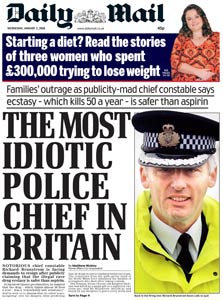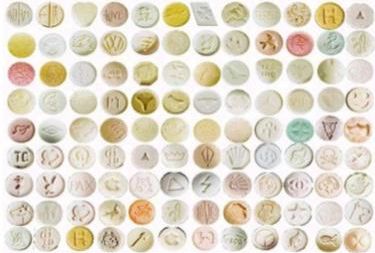 Some of us are more inclined to believe the most idiotic police chief in Britain is the delusional murderer in charge of the Met.
Some of us are more inclined to believe the most idiotic police chief in Britain is the delusional murderer in charge of the Met.
The Mail meanwhile had another target in its sights: Richard Brunstrom, chief constable of north Wales police, denounced as the head of the "traffic Taliban" and a known critic of the failures of drug prohibition had been on the Today programme and been making his views clear. From this, the Mail has conjured up "outrage" and is demanding his head on a platter.
Notorious chief constable Richard Brunstrom is facing demands to resign after publicly claiming that the illegal rave drug ecstasy is safer than aspirin.
In his latest bizarre proclamation, he insisted that the drug - which claims almost 50 lives a year - was a "remarkably safe substance".
And he went on to dismiss what he called "scaremongering" over the dangers, while predicting that all drugs would be legalised within ten years.
In the Mail's parlance, a bizarre proclamation appears to be repeating an established fact. Despite the 90s moral panic, led by the Mail about the dangers of ecstasy, MDMA itself is indeed remarkably safe. The main dangers of taking MDMA are not from the drug itself but what the individual does during/after taking it. The majority of deaths after someone has taken MDMA are caused either by dehydration and overheating, by not taking on enough fluids while dancing, or by the exact opposite, by drinking too much water, which can lead to hyponatremia or water intoxication. Water intoxication is what killed Leah Betts, the most well known "Ecstasy victim", not the MDMA which she consumed.
The other major safety concern about Ecstasy is its purity. The tablets are routinely "cut" with other substances, and while only very rarely have these other substances been innately dangerous, they can contain other stimulants, which have their own effects and dangers. The biggest question about the safety of MDMA is not its immediate effects, but the side-effects in the long term. Because MDMA only came into wide mainstream use in the late 1980s, these are still relatively unknown, but studies have raised concerns about depression, especially due to how MDMA affects serotonin levels, and memory loss.
Where Brunstorm has exaggerated and stretched the facts is in comparing the drug to aspirin. It's not a good comparison for the simple reason that aspirin isn't a recreational drug, unless you're permanently popping painkillers. While aspirin can be used in suicide attempts, it's still not a good comparison because so can almost anything else. He is however quite right that research has found that MDMA is safer in terms of potential harm than both alcohol and tobacco. While he might not be quite right in stating that government research has found MDMA to be safer than both, where he appears to be referring to the findings of the Science and Technology committee report in 2006 (PDF, page 176) the recent attempt by a number of drug experts to create a rational scale to assess the harm posed by the misuse of drugs ranked MDMA as 18th most dangerous of the 20 substances examined, with only alkyl nitrates and khat below it. Heroin was the most dangerous, while cocaine, which isn't ranked in terms of crack and powder, was second, with barbiturates third. Alcohol was 5th and tobacco 9th. Cannabis was 11th.
The Daily Mail however has never been a newspaper to let the facts get in the way of its apoplexy. It got straight on the blower to the bereaved in order to get them to condemn the most idiotic policeman in Britain:
Des Delaney, whose 18-year-old daughter Siobhan was killed by a single pill at a nightclub two years ago, said Mr Brunstrom "should go and stand by my daughter's grave every week and see how he feels".
Mr Delaney appears to be projecting his grief and maybe even his guilt. How Brunstrom's comments affect his daughter's death in any way appears to be unclear: are the police meant to have stopped her from purchasing the tablet which apparently killed her? How is Brunstrom, arguing as he is for an end to prohibition, doing anything other than giving his own point of view?
Recent figures show that between 1999 and 2004, UK deaths from ecstasy, a Class A illegal drug, rose from 26 to 48 per year - putting them roughly on a par with fatalities from cocaine.
Cocaine though, unlike MDMA, is a highly addictive drug, and while it is mostly only dangerous in the short-term through the strain it places on the heart, the long-term side effects are legion and well-documented.
And campaigners said his comparison was "absurd", since aspirin is taken for medical reasons and also saves countless lives, whereas ecstasy is illegal and is taken for kicks.
What does MDMA's illegality have to do with it? That gives an insight into the campaigners the Mail has contacted to comment, who are concerned only with prohibition and not examining what works and what doesn't.
Mary Brett, UK spokesman for the Europe Against Drugs campaign group, said: "This was an extremely stupid and irresponsible comment. Aspirin is taken as medication to help people get better. Ecstasy is taken to upset the chemical balance of the brain deliberately.
Ah yes, that's exactly what those taking MDMA are doing. "Have you got any E's mate, I'm looking to upset the chemical balance of my brain deliberately so as to get a proper buzz on?" Europe Against Drugs is currently campaigning for magic mushrooms, an incredibly safe hallucinogen not even featured on the Lancet's harm graph to be banned in the Netherlands, which ought to tell you all you need to know about their positioning.
Richard Brunstrom is supposed to be a figure of authority and responsibility, respected by young people, and he's sending out a very dangerous message.
Indeed. The young have always respected the police.
Peter Stoker of the National Drugs Prevention Alliance said: "Mr Brunstrom should resign. His comments are increasingly incompatible with his position.
"Danger from an illegal drug isn't just a question of how poisonous it is in the short term - although any dose of ecstasy can kill - it includes the damaging behaviour which people are sucked into, and the harm it does to those around them, particularly their families."
Now this is dangerous and irresponsible commenting. MDMA itself very rarely if ever kills, it's the other actions that kill. Stoker is also trying to suggest that MDMA causes damaging behaviour, and unless you include overfriendliness and gurning to be damaging, this is clearly nonsense. MDMA is not heroin or crack, and trying to suggest it is or even that it's an stepping-stone to "harder" drugs is specious reasoning.
Shadow Home Secretary David Davis said: "If you strike the attitudes taken by this particular chief constable, if you thoughtlessly downgrade cannabis, if you treat dangerous drugs as 'no worse than aspirin', you make a gift to the drug dealers and criminals who are destroying the lives of so many young people."
David Davis really doesn't get it, does he? Brunstrom's very reasoning is that prohibition has failed because of those very same drug dealers and criminals "who are destroying the lives of so many young people". Their illegality does nothing to stop their spread whilst also criminalising those who find themselves sucked into cycles of addiction and dependence. The continued prescribing of methadone when prescribing heroin itself is both safer and found to be more effective in helping addicts quit, which Brunstrom has also argued for, is similarly based on such reasoning. Davis and the Conservatives have railed against the reclassification of cannabis at Class C yet have completely ignored the evidence which suggests that consumption has dropped as a result.
Both the Mail's and the Conservatives' position is based around the doctrine that the best prevention is blanket prohibition, which is also in their eyes morally justifiable. Both refuse to so much as countenance the view that drugs need to be measured by the harm they do cause rather than the harm they can cause, as the paper published in the Lancet set out to do. After all, who better to talk about the dangers of drugs than journalists for the middle-classes, both known for their copious intake of Colombian marching powder or wanker fuel, while the Tories are lead by a man who refuses to talk about his past drug taking as a private matter, with a shadow chancellor notorious for his past snorting habit. At least Labour ministers admitted to having sampled cannabis, even if they then told today's youth not to give into the temptations they did. Through the manufactured newspaper outrage and the political opportunism based on prejudices rather evidence and research, drug policy in this country remains trapped in the same rut since the passing of the Misuse of Drugs Act. That in itself will lead to more deaths and damage over time than MDMA ever will.Labels: Daily Mail-watch, drug prohibition, Ecstasy, idiocy, Mail-watch, MDMA, moral panics, Richard Brunstrom



